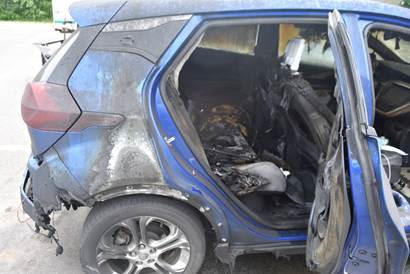
The Vermont State Police released this photo of the 2019 Chevrolet Bolt EV that caught fire on July 1, 2021 in the driveway of state Rep. Timothy Briglin, a Democrat.
Vermont State Police
A Chevrolet electric vehicle owned by a Vermont state lawmaker who backed the industry recently caught fire while charging in the politician’s driveway, according to Vermont State Police.
The vehicle, a 2019 Chevrolet Bolt EV, is part of a recall of nearly 69,000 of the electric vehicles globally that was announced in November by General Motors and the National Highway Traffic Safety Administration. It’s unknown if state Rep. Timothy Briglin, a Democrat, took the Bolt in for service for the recall.
The fire is the most recent to highlight an ongoing concern of automakers and vehicle safety watchdogs as companies release an influx of new electric vehicles in the coming years. Automakers have continually touted the environmental benefits of EVs, however the lithium-ion batteries that power the vehicles can be dangerous and result in significant chemical fires if something goes wrong.
The Vermont State Police said the cause of the fire “appears to be an undetermined electrical system failure” that started within the passenger compartment in the area of the back seat. The origin of the fire is consistent with a handful of previous fires reported to federal regulators and the company in Bolt EVs.
GM will investigate
GM said in a statement sent to CNBC on Wednesday that it’s working with local authorities and “will investigate to learn more about the specific situation of this incident.” A spokesman for the Detroit automaker declined to comment further on the fire, including whether the recall repair had been completed for the vehicle.
Briglin, a supporter of EVs and chair of the state House Committee on Energy and Technology, did not immediately respond for comment. Officials with the NHTSA, local fire department and Vermont Department of Public Safety Fire and Explosion Investigation Unit, which investigated the fire, also did not immediately respond for comment.
The fire was reported at about 9 a.m. Thursday at Briglin’s house in Thetford, Vermont, according to a release from Vermont State Police and public records. No injuries were reported.
GM recalled the vehicles in November over electrical fires it said were caused by a rare manufacturing defect in certain battery modules in vehicles produced for the 2017- 2019 model years.
The fix for it requires installing advanced onboard diagnostic software into the vehicles that, among other things, has the ability to detect potential issues related to changes in battery module performance before problems can develop.
Customers must take their vehicles into a Chevrolet dealer to get the fix.
Ongoing concern
EVs produced by Tesla have been among the most high-profile reported fires, including a high-performance 2021 Tesla Model S Plaid sedan last week. But EV fires are a potential problem for all companies as the industry releases a fleet of new electric vehicles in the coming years.
“Safety needs to come first,” Jason Levine, executive director of the Center for Auto Safety, a Washington D.C.-based advocacy group, told CNBC. “There remain open questions as to why there seems to be a growing trend of lithium-ion batteries in vehicles catching on fire.”
This Tesla Model S Plaid caught fire while the driver was at the wheel, according to a local fire department chief and attorneys representing the driver, on June 29, 2021, in Haverford, Pennsylvania
Provided by Geragos & Geragos
The lithium-ion batteries that power EVs are extremely complex and can result in long-lasting chemical fires if there’s a problem or following a high-speed crash. Traditional vehicles with internal combustion engines also can catch fire, but it’s unclear at this time if EVs pose more of a threat, according to Levine.
“There’s no good data on this yet,” he said. Regarding crashes, Levine questioned if whether more fires are just being reported because more EVs are on U.S. roadways or if there is more of a risk of fires for EVs than vehicles with internal combustion engines.
Following reports of EV fires, the National Transportation Safety Board published a report last year about the risks to emergency responders from battery fires in electric vehicles. The NHTSA also released earlier report this year a “Battery Safety Initiative” designed to collect and analyze data related to electric vehicle battery safety as well as conduct special investigations of electric vehicle crash and non-crash events related to battery safety.
Levine said he’s “encouraged” by the environmental benefits of EVs, but there needs to be more done regarding protocols and regulations around the safety of EVs in the U.S. He specifically cited new standards in Europe around EV safety ratings that the U.S. has yet to take up.
“This is the moment to get this right,” he said. “As both public and private infrastructure is really investing in the future of EVs and the potential for them, we get our hands collectively as an auto field universe around making these things are safe, or as safe as can be.”




